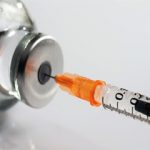Measles Vaccine
Before a measles vaccine became available, almost all people in the U.S. got measles before the age of 15. The first measles vaccine, a killed version, became available in 1963. This was followed in 1968 by a more effective live virus vaccine, which is the only one that has been available in the U.S. since that time.4 It is now usually combined with mumps and rubella (MMR) or with varicella added (MMRV).1
A U.S. measles outbreak in 1989 prompted the CDC’s Advisory Committee on Immunization Practices and the American Academy of Pediatrics to recommend a second dose of the MMR vaccine.4 Dr. Calabrese clarifies that the second dose is not a booster and, therefore, is not needed to make the first dose work, but it is important for high-risk groups. “The goal is that the second dose will cover anyone who might not have had a response to the first vaccine,” she explains. “One dose of MMR vaccine is 93% effective against measles, and two doses are 97% effective.” In the U.S. and other areas of relatively low incidence, the first vaccine is recommended at 12 to 15 months, with the second following around age 5.1
Dr. Calabrese is frequently asked by her rheumatology patients about whether they have adequate protection from measles. She asks them to try to locate their written immunization records. She notes that if they received at least one dose of the live MMR vaccine, then they don’t need to do anything additional per CDC recommendations, unless they are at high risk. High-risk groups include college students, healthcare workers and foreign travelers, who should receive a second dose of the MMR vaccine if they have never had one.5
“For most adult patients it’s a non-issue,” says Dr. Winthrop. “They’ve been vaccinated, or they have natural immunity.” Per current clinical guidelines, patients born before 1957 are also considered to have evidence of immunity and need not worry about vaccination; the virus was so common then that they are extremely likely to be immune. Patients born after 1957 who have not been vaccinated but who report a history of measles need to show laboratory confirmation of measles to have evidence of immunity.5
Notes Dr. Calabrese, “If your patient says, ‘I think I had the measles,’ that isn’t sufficient.”
Dr. Winthrop adds, “If there’s a question, you can always check the IgG test, the serology, to see if they are immune. It’s pretty unusual to not have immunity, except in the last decade or two, when you started seeing a lot more people going unvaccinated.”
The IgG is an easy, inexpensive blood test that should be available to most practitioners, says Dr. Calabrese. “It would never be wrong to check if someone can’t find their immunization records. If it is low, you can vaccinate them. There is no harm in getting another vaccine if they happened to have had it before and just couldn’t find their paperwork.”


